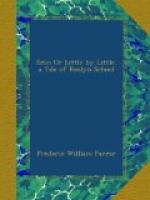And yet, although we know it to be a mere delusion, we all idealise and idolise our childhood. The memory of it makes pleasant purple in the distance, and as we look back on the sunlight of its blue far-off hills, we forget how steep we sometimes found them.
After Barker’s discomfiture, which took place some three weeks after his arrival, Eric liked the school more and more, and got liked by it more and more. This might have been easily foreseen, for he was the type of a thoroughly boyish mind in its more genial and honorable characteristics, and his round of acquaintances daily increased. Among others, a few of the sixth, who were also day-scholars, began to notice and walk home with him. He looked on them as great heroes, and their condescension much increased his dignity both in his own estimation and that of his equals.
Now, too, he began to ask some of his most intimate acquaintances to spend an evening with him sometimes at home. This was a pleasure much coveted, for no boy ever saw Mrs. Williams without loving her, and they felt themselves humanised by the friendly interest of a lady who reminded every boy of his own mother. Vernon, too, now a lively and active child of nine, was a great pet among them, so that every one liked Eric who “knew him at home.” A boy generally shows his best side at home; the softening shadows of a mother’s tender influence play over him, and tone down the roughness of boyish character. Duncan, Montagu, and Owen were special favorites in the home circle, and Mrs. Williams felt truly glad that her son had singled out friends who seemed, on the whole, so desirable. But Montagu and Russell were the most frequent visitors, and the latter became almost like one of the family; he won so much on all their hearts that Mrs. Williams was not surprised when Eric confided to her one day that he loved Russell almost as well as be loved Vernon.
As Christmas approached, the boys began to take a lively interest in the half-year’s prizes, and Eric was particularly eager about them. He had improved wonderfully, and as both his father and mother prevented him from being idle, even had he been so inclined, he had soon shown that he was one of the best in the form. Two prizes were given, half-yearly to each remove; one for “marks” indicating the boy who had generally been highest throughout the half year, and the other for the test proofs of proficiency in a special examination. It was commonly thought in the form that Owen would get the first of these prizes, and Eric the other; and towards the approach of the examination, he threw his whole energy into the desire to win. The desire was not selfish. Some ambition was of course natural; but he longed for the prize chiefly for the delight which he knew his success would cause at Fairholm, and still more to his own family.




